 Petzlover
Petzlover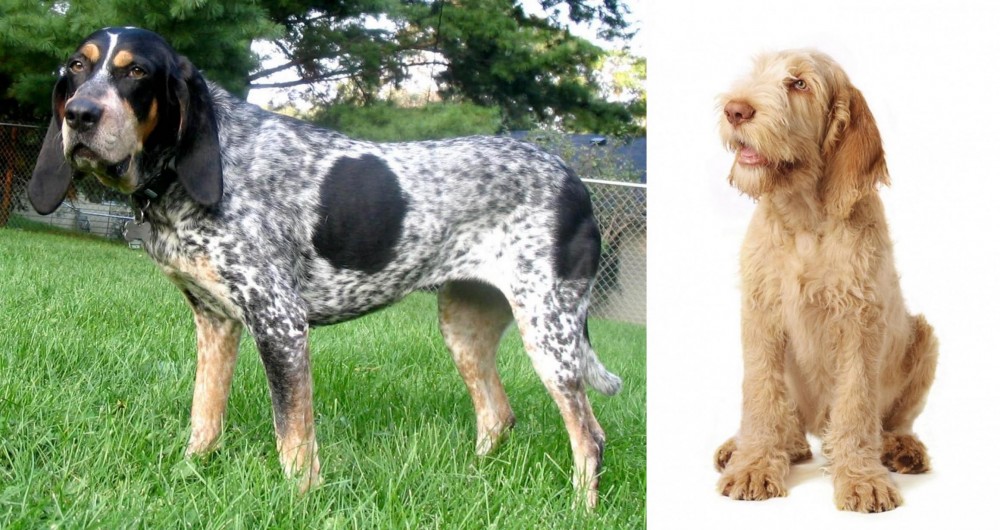 Griffon Bleu de Gascogne is originated from France but Spinone Italiano is originated from Italy. Griffon Bleu de Gascogne may grow 13 cm / 5 inches shorter than Spinone Italiano. Griffon Bleu de Gascogne may weigh 12 kg / 26 pounds lesser than Spinone Italiano. Griffon Bleu de Gascogne may live 3 years more than Spinone Italiano. Griffon Bleu de Gascogne may have less litter size than Spinone Italiano. Both Griffon Bleu de Gascogne and Spinone Italiano requires Moderate Maintenance.
Griffon Bleu de Gascogne is originated from France but Spinone Italiano is originated from Italy. Griffon Bleu de Gascogne may grow 13 cm / 5 inches shorter than Spinone Italiano. Griffon Bleu de Gascogne may weigh 12 kg / 26 pounds lesser than Spinone Italiano. Griffon Bleu de Gascogne may live 3 years more than Spinone Italiano. Griffon Bleu de Gascogne may have less litter size than Spinone Italiano. Both Griffon Bleu de Gascogne and Spinone Italiano requires Moderate Maintenance.
 The Griffon Bleu de Gascogne dog hails from France and is descended from crosses between the Bleu de Gascogne as well as the Griffon Nivernais. Dog experts tell us that the Grand Griffon Vendeen is also part of the mix.
The Griffon Bleu de Gascogne dog hails from France and is descended from crosses between the Bleu de Gascogne as well as the Griffon Nivernais. Dog experts tell us that the Grand Griffon Vendeen is also part of the mix.
Raised as working dogs, with his good nose and alertness, he has always been used as a single hunting dog or being used as part of a pack.
It was in 1920 that the first Griffon Bleu de Gascogne breed standard was written in France, and over the decades, the dog hasn’t changed much in looks except that it is slightly taller.
This is a rare breed not much seen outside of France, but breeding attempts have taken it from ‘close to extinction’ to a popular pet today.The Griffon Bleu de Gascogne was recognized by the United Kennel Club in 1991.
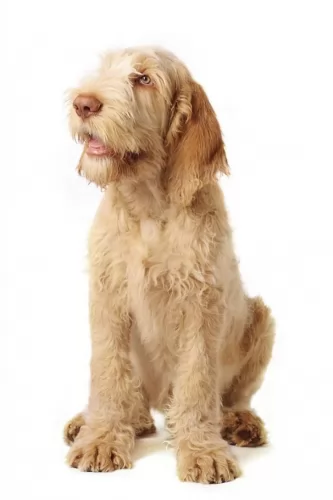 This Italian breed has an ancient blood line tracing all the back to 500 BC. Originally bred to hunt, he is today a friendly, alert and loyal companion. He is intelligent enough to do any job you give him. The Spinone is thought to be one of the oldest gun dogs ever, but it is not entirely clear that he came from Italy. There are some who think he may have come from somewhere in these European countries – Italy, Greece, France, Celtic Ireland, Spain or Russia. However, most believe the breed came from Italy in the Piedmont area.
This Italian breed has an ancient blood line tracing all the back to 500 BC. Originally bred to hunt, he is today a friendly, alert and loyal companion. He is intelligent enough to do any job you give him. The Spinone is thought to be one of the oldest gun dogs ever, but it is not entirely clear that he came from Italy. There are some who think he may have come from somewhere in these European countries – Italy, Greece, France, Celtic Ireland, Spain or Russia. However, most believe the breed came from Italy in the Piedmont area.
The most common thinking is that he is a descendent of the Spanish Pointer and/or the Russian Setter. One other theory is that setters from Greece were brought to the Roman Empire and crossed with a variety of Italian dog to make the coarse haired Spinone we see today. Then the French put in their claim that the breed is a cross of many French pointers.
The theory that counts might just belong to the Italians who believe the ancestor to the Spinone includes the German Wirehaired Pointer, the Pudelpointer and the Wirehaired Pointer. It was not until the 19th century that the name Spinone was officially given to the breed.
Before that it might have been known as a Spinoso and named after a thorn bus in Italy called the Spino. This bush was so thick and sharp that small prey animals learned to hide under it because the predators could not get through it. The Spinone however was able to fight through the briars with its thick, coarse hair and tough skin.
The breed almost became extinct during the second world war as before and after the hunters in Italy had started to use other breeds for hunting. Breeders also began to cross the Spinone with wire hairs like German Wirehaired Pointer, the Wirehaired Pointing Griffon and the Boulet.
The most popular hunting dog in Italy today is the Bracco Italiano while the Spinone is still used for hunting.
 This is a medium to large sized scenthound. He stands at anything between 48 to 57cms and weighs between 16 and 27kg.
This is a medium to large sized scenthound. He stands at anything between 48 to 57cms and weighs between 16 and 27kg.
He has a long, wiry type of coat which is usually a mottled white and black, taking on a blue hue look. There are tan marking above the eyes and around the muzzle. The ears of the dog are long and floppy, he has that typical soulful look in his brown eyes and the tail is long with a curve at the point.
The Griffon Bleu de Gascogne is an intelligent dog breed, capable of learning quickly and therefore will do well with training and socialization.
This popular docile dog gets on well with other pets in the home as well as with children. He is alert and energetic but is known to be a loyal and loving dog, being good with children, particularly those he grew up with.
The dog isn't particularly well suited to city life simply because of his high energy. He will require a good deal of exercise, so essentially he needs a home with a fair sized garden. He will want to join you on your walks. Walks provide your pet with stimulation and are good for socializing a dog too.
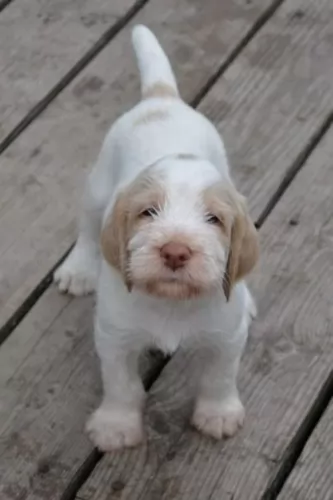 The breed is made up of strong, solid and muscled dogs that have an almost square build. His legs are made to travel any terrain and his head is long with an occipital that is pronounced and unique to the Spinone. They are said to have “human appearing eyes”, with a docked tail in countries allowing it and webbed paws.
The breed is made up of strong, solid and muscled dogs that have an almost square build. His legs are made to travel any terrain and his head is long with an occipital that is pronounced and unique to the Spinone. They are said to have “human appearing eyes”, with a docked tail in countries allowing it and webbed paws.
Shorter hair covers their feet, head, legs, muzzle and ears. They have longer hair on their eyebrows and it is stiff, with soft hair on the muzzle and cheeks with a beard and mustache. It is a single coated dog though the coat is rough. They should have skin, lips, nose, and pads in colors that coordinate with their coats. For white dog it is a red-orange color, brown in dogs that are roan colored and dark red-orange in the orange and white colored dog.
 Your Griffon Bleu de Gascogne is such a popular pet in France and Spain simply because he is so amicable, getting on well with everyone in the home.
Your Griffon Bleu de Gascogne is such a popular pet in France and Spain simply because he is so amicable, getting on well with everyone in the home.
He is everything that a pet lover wants – loving, protective, friendly and companionable. They get on well with other pets too and they’re easy to train, becoming super obedient. Add to that the fact that he isn’t a sickly dog and is also fairly low maintenance.
This dog has all it takes to make him the most splendid pet.
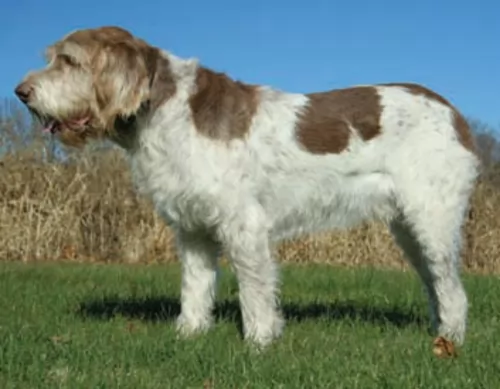 3.Adaptability – Young dogs need a lot of attention but they don’t need a lot of space. The young dogs are energetic while the adult dogs are laid-back. They need exercise every day and at least a small back yard.
3.Adaptability – Young dogs need a lot of attention but they don’t need a lot of space. The young dogs are energetic while the adult dogs are laid-back. They need exercise every day and at least a small back yard.
 As a healthy dog breed, your Griffon Bleu de Gascogne isn't likely to cost you much at the vet. Nonetheless there are some common dog ailments that you need to be aware of.
As a healthy dog breed, your Griffon Bleu de Gascogne isn't likely to cost you much at the vet. Nonetheless there are some common dog ailments that you need to be aware of.
Some dog owners, when buying a Griffon puppy, want to see health clearance certificates to show that the parents of the puppy are free from the like of certain diseases such as hip dysplasia and von Willebrand's disease.
This is a condition where your dogs thighbone doesn't fit properly into the hip joint. Your puppy can develop this condition from 4 months of age already.
With some dogs you can see the pain, and they may even become lame in one or both back legs. Hip dysplasia is hereditary, but environmental factors such as an injury or the wrong diet can contribute towards your pet succumbing to hip dysplasia.
A skin allergy can make your pet totally miserable as they lick and scratch with discomfort, pain and irritation. All the scratching and licking can cause secondary infections and your pet can even lose his hair.
Atopic Dermatitis is when your dog is allergic to things like dust or pollen. Some people look at homeopathic treatments for dogs and are pleased with the results. The thing is you need to get help for your pet as it can cause your pet endless misery.
 This is an ancient breed with not a lot of documented genetic issues, but it does have one deadly condition.
This is an ancient breed with not a lot of documented genetic issues, but it does have one deadly condition.
• Cerebellar ataxia (CA) is inherited and hits the puppies. Because it is a recessive gene both the mother and father must carry it for the puppy to inherit it. This makes it less likely than it would be otherwise. Puppies with the condition do not live more than a year. Since it is a genetic problem there is now a test for it that identifies carriers at a 95% accuracy rate.
• Like many other large breed dogs, they are susceptible to hip dysplasia. This can cause arthritis and/or lameness. There are now hip replacement surgeries available for this condition.
• Bloat is again common in large dogs and you need to watch for it with the Spinone. It can be deadly if not treated immediately. Let your dog rest quietly after eating. Do not let her exercise or play energetically after eating.
 The Griffon Bleu de Gascogne is a rough, shaggy, fairly long coated dog and is an average shedder. He will therefore require regular brushing to get rid of grass and burrs that cling to the hair, causing it to matt and tangle.It's always a good chance for you to check him over for ticks and fleas too.
The Griffon Bleu de Gascogne is a rough, shaggy, fairly long coated dog and is an average shedder. He will therefore require regular brushing to get rid of grass and burrs that cling to the hair, causing it to matt and tangle.It's always a good chance for you to check him over for ticks and fleas too.
He has floppy ears, so these will require cleaning to prevent infections. Check his nails too and trim them as needed. Take him to the vet for this if you're not sure how or you don't have the correct grooming tools.
Just like his human family, a dog needs to have his own sleeping spot – a place which is warm and dry and which he can retreat too. It is a good idea to train your dog to sleep in his own place where there are some warm blankets which are clean and comfortable for him.
You chose to bring a dog into your home, and it is therefore your responsibility to see that he is looked after well.
To keep him healthy, he will require high-quality kibble twice a day. How much your Griffon eats will depend on his age and his activity levels. Follow the feeding directions carefully on the packaging to ensure you keep him in good shape.
Remove the boredom of the same food every day by adding in some raw meat as well as cooked chicken, rice and vegetables as a tasty treat. This will keep him alert, healthy and his coat shiny. Fresh, cool water should be constantly available.
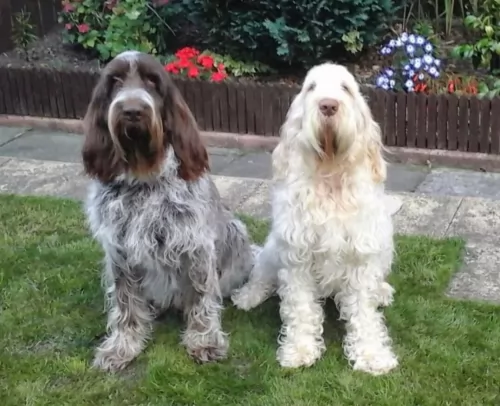 1Feeding the puppy – feed a high quality dog food for puppies of large breeds. Feed 3-4x day but don’t overfeed or let him exercise after eating even as a puppy.
1Feeding the puppy – feed a high quality dog food for puppies of large breeds. Feed 3-4x day but don’t overfeed or let him exercise after eating even as a puppy.
2.Feeding the adult - feed a high quality dog food for large breeds. Feed 1-2X day but don’t overfeed or let him exercise after eating.
4. Games and Exercises – The Spinone is an active breed, but not a fast dog. In fact, they like to travel at a trot so it becomes a great dog for jogging or running with. They love to jump, track, hunt, hike. They do well with agility, retrieving, flyball, carting, being a therapy dog, a rescue dog and a watchdog.